For a century, almost all light-duty vehicles (LDVs) have been powered by internal combustion engines operating on petroleum fuels. Energy security concerns about petroleum imports and the effect of greenhouse gas (GHG) emissions on global climate are driving interest in alternatives. Transitions to Alternative Vehicles and Fuels assesses the potential for reducing petroleum consumption and GHG emissions by 80 percent across the U.S. LDV fleet by 2050, relative to 2005.
This report examines the current capability and estimated future performance and costs for each vehicle type and non-petroleum-based fuel technology as options that could significantly contribute to these goals. By analyzing scenarios that combine various fuel and vehicle pathways, the report also identifies barriers to implementation of these technologies and suggests policies to achieve the desired reductions. Several scenarios are promising, but strong, and effective policies such as research and development, subsidies, energy taxes, or regulations will be necessary to overcome barriers, such as cost and consumer choice.






Reviews
There are no reviews yet.